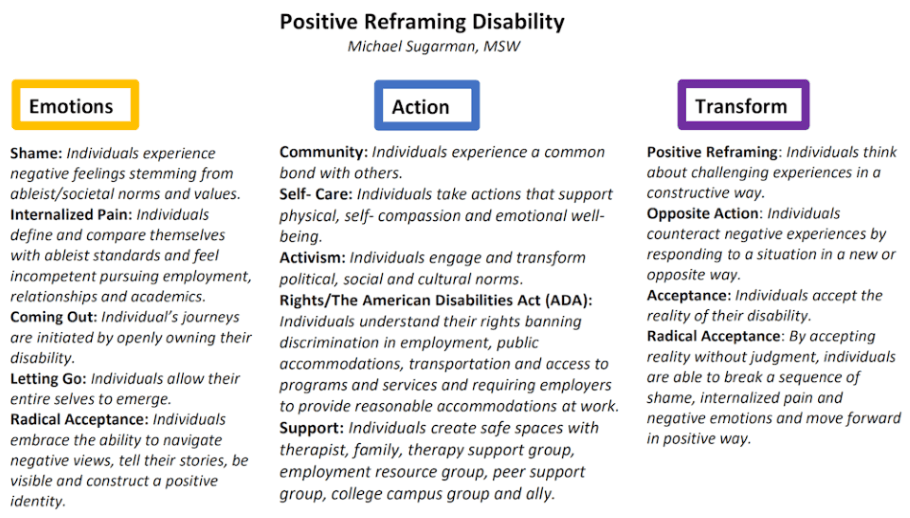Positive Reframing Disability Model
Author: Michael Sugarman, MSW
Published: 2021/08/04 - Updated: 2023/09/14
Publication Type: Informative
Category Topic: Disability Information - Academic Publications
Page Content: Synopsis - Introduction - Main
Synopsis: Positive Reframing Disability describes the stages that people with disabilities experience. Their journeys are not linear. They progress and regress and may go through stages multiple times and/or simultaneously. Using skills such as positive reframing, opposite action, acceptance, and radical acceptance support people with disabilities move from a negative self-concept to a liberating self-image.
Introduction
No one goes to sleep with a lifetime of negative self-talk about their disability and wakes up with a sense of pride in their identity. Shifting from shame to radical acceptance is not a simple transformation. Using skills such as positive reframing, opposite action, acceptance, and radical acceptance support people with disabilities move from a negative self-concept to a liberating self-image.
Main Content
Positive Reframing Disability: describes the stages that people with disabilities experience. Their journeys are not linear. They progress and regress and may go through stages multiple times and/or simultaneously.
These stages can include:
Emotions
- Shame: Individuals experience negative feelings stemming from ableist/societal norms and values.
- Internalized Pain: Individuals define and compare themselves with ableist standards and feel incompetent pursuing employment, relationships and academics.
- Coming Out: Individuals' journeys are initiated by openly owning their disabilities.
- Letting Go: Individuals allow their entire selves to emerge.
- Radical Acceptance: Individuals embrace the ability to navigate negative views, tell their stories, be visible and construct positive identities.

Action
- Community: Individuals experience a common bond with others.
- Self-Care: Individuals take actions that support physical, self- compassion and emotional well-being.
- Activism: Individuals engage and transform political, social and cultural norms.
- Rights/The American Disabilities Act (ADA): Individuals understand their rights banning discrimination in employment, public accommodations, transportation and access to programs and services and requiring employers to provide reasonable accommodations at work.
- Support: Individuals create safe spaces with therapist, family, therapy support group, employment resource group, peer support group, college campus group and ally.
Transform
- Positive reframing: Individuals think about challenging experiences in a constructive way.(1)
- Opposite Action: Individuals counteract negative experiences by responding to a situation in a new or opposite way.(2)
- Acceptance: Individuals accept the reality of their disability.
- Radical Acceptance: By accepting reality without judgment, individuals are able to break a sequence of shame, internalized pain and negative emotions and move forward in positive way.(3)
Resources:
- (1) Harvard University Stress & Development Lab (n.d.). Positive Reframing and Examining the evidence Harvard University.
- (2) Schenck Ph.D., Laura. 10 Practical Examples of Opposite Action - Part Two.
- (3) Skyland Trail., Accepting Reality Using DBT Skills. October 28, 2019.
- Bogart, Kathleen. How disability pride fights ableism Psychology Today. August 10,2020.
- Disabled World - Models of Disability: Types and Definitions Published:2019-12-06
- Dunn, Dana and Shane Bucaw. Thinking about disability identity APA Disability Newsletter. November 2013
- Sugarman, M. The journey from Shame to Disability Pride Disabled World July 13, 2021
- Sugarman, M, & Phred Swain-Sugarman. Ableism to Disability Pride-Transformation Model Disabled World July 5, 2021
- Sugarman, M. Psychosocial Speech Disability (Stuttering) Transforming Ourselves and Society Disabled World June 14, 2021
- Sugarman, M. "Peer Counseling and Self-Help Group Facilitation for People who Stutter" National Stuttering Project 1995
- Sugarman, M. "It's Ok to Stutter: Personal Account" Journal of Fluency Disorders Vol. 5 Number 2 June 1980
- Sugarman, M. "From Being a Stutterer to Becoming a Person who Stutters" Transactional Analysis Journal Vol. 9 Number 1 January 1979